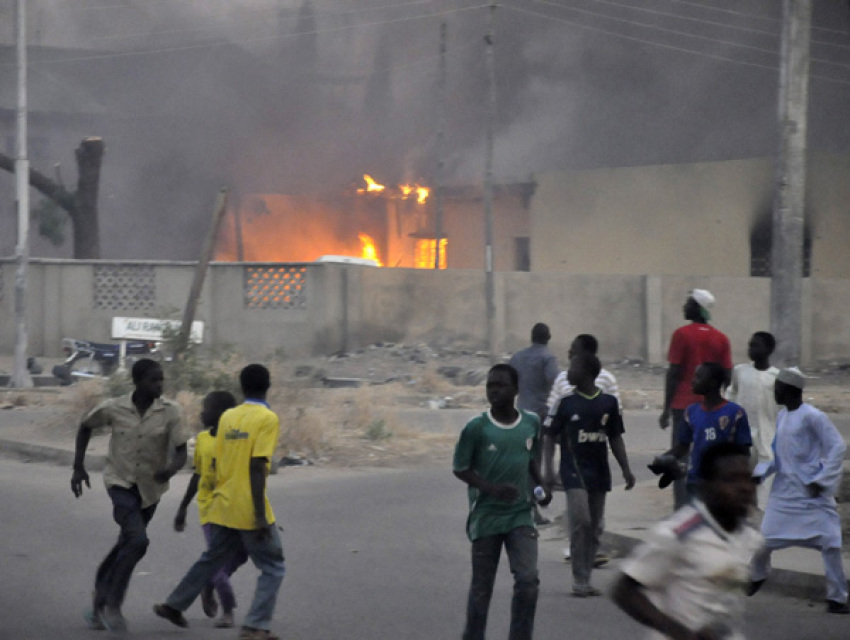Islamic Extremist Bomb Attacks Kill 150 in Nigeria
Islamic militant group, Boko Haram, has conducted a series of coordinated attacks in the northern Nigerian city of Kano Friday, killing more than 150 people, reports have indicated.
Multiple explosions hit police buildings around the city, which has since been ordered under a 24-hour curfew. The attacks seem to mark Boko Haram’s deadliest assault to date, as the terrorist group seeks to overthrow the national government to impose a fully Islamic state in the country.
Over recent months the group has increasingly targeted government buildings as well as Christian churches and civilians in an array of attacks killing hundreds.
According to the BBC, approximately 150 bodies have so far been piled into the city’s mortuary, and Red Cross teams have been on the streets helping with the aftermath.

Nigeria has been suffering from religious violence for years, with attacks often occurring during the Christmas season. At least three dozen people were killed in a string of bombings last month. Since December, more than 80 Christians have been killed by radical Muslims, according to International Christian Concern (ICC), an advocacy group.
Pastor Ayo Oritsejafor, Christian Association of Nigeria’s president, recently decried the Nigerian government's failure to protect Christians from attacks and accused some security agents of taking sides.
"The security agencies are polarized along religious lines," he said. "Even when the security agents have information (concerning security measures to be taken against Boko Haram), some of them pass the information to these criminals. This is because some of the security agents are more loyal to their religion (Islam) than to Nigeria as a nation."
It also emerged Wednesday that the man believed to be behind the deadly Christmas bombings managed to escape authorities after being captured.
"I think some people are trying to change the demographics on [the] ground; to do everything to move them out of the North," the church leader said, insisting that politics were at play. Oritsejafor claimed that Muslim politicians were sponsoring young people – members of Boko Haram – to do the killings.
That concern was confirmed by ICC’s religious manager, Jonathan Racho, who told CP that even President Goodluck Jonathan suspects his government has been infiltrated by Muslim extremists.
Jonathan has been facing mounting criticism for not providing adequate protection for the nation's Christian community. Oritsejafor addressed his president in the interview: "You must muster the political will to make strong decisions. Any of the heads of the security agencies that are not performing, you should remove."
The U.S. Commission on International Religious Freedom (USCIRF) has also found evidence to support the charge that President Jonathan could do more to protect vulnerable Christians and other citizens that have found themselves under attack.
"The United States must vigorously press the Nigerians to address the violence through law enforcement and prosecutions, such as
during meetings of the U.S.-Nigeria Bi-National Commission," the organization’s chair, Leonard Leo said recently.
Open Doors listed Nigeria 13th on its list of nations in which Christians are most persecuted. A solution to the problem may start with Muslim-Christian cooperation, Dykstra said, but the terror sect will not be stomped out until Jonathan’s government takes greater control of the situation.
"I think Goodluck Jonathan is feeling the pressure and the heat and [Christians should] pray for him to make decisions so that this doesn't turn into a major civil war," Dykstra said.
Boko Haram, which translated means “Western education is forbidden,” wants Islamic Shariah law to be imposed across the country. In recent months the group has launched a bloody campaign of violence.
Nigerian police have released a statement saying that four police stations were bombed across the city, and that the headquarters of the State Security Service (SSS), as well as passport and immigration offices were also targeted.
A Boko Haram spokesman, Abul Qaqa, has also announced to journalists that it had carried out the attacks because the authorities had refused to release group members arrested in Kano.
(Christian Post reporter Luiza Oleszczuk contributed to this report)



























